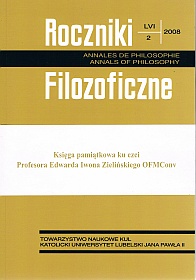Jak być sprawiedliwym? Ryszarda Kilvingtona komentarz do Etyki Arystotelesa
Abstrakt
The article presents Richard Kilvington’s interpretation of Aristotle’s views on the concept of justice. Richard Kilvington was a fourteenth century philosopher and theologian who commented on various Aristotle’s works including Nicomachean Ethics. Kilvington’s commentary on Nicomachean Ethics was composed in 1325-1326 at Oxford University. It contains, among others, a question Utrum iustitia sit virtus moralis perfecta, which is devoted to the concept of justice. In his investigations Kilvington always uses logic as a major analytical tool, and mathematics as a method to discuss the issues and settle between opposite points of view, which is common for Kilvington’s commentaries. These techniques allow him to indicate all the contradictions in Aristotle’s analyses. Kilvington’s concept of justice clearly points to twofold order: horizontal and vertical. In the horizontal one Kilvington’s distinguishes the virtue of absolute justice that is a perfect model for all kinds of justice. In the vertical one he presents a model of a just man that is such a man who is ‘perfectly harmonious’. He also indicates the order of justice existing in the world, visible in human relationships, and regulated by three kinds of justice viz. compensatory, distributive and political. Kilvington’s investigations complete Artistotle’s opinions on justice, however they remain in the field of Aristotelian analyses and his concept of morality implemented in society. In this question Kilvington consistently separates the supernatural order and the order of natural reason, and, in his ethics, he never refers to theological issues concerning the relation between God and created world, which was uncommon for medieval theoretical practice.
Bibliografia
Jung E., Podkoński R.: Richard Kilvington on proportions, [w:] Mathématiques et théorie du mouvement XIVe-XVIe siècles, éd. J. Biard, S. Rommevaux, Tour 2007, s. 81-101.
Jung-[Palczewska] E.: Works by Richard Kilvington, „Archives d’histoire doctrinale et littéraire du Moyen Age” 67 (2000), s. 182-223.
Jung-[Palczewska] E.: Między filozofią przyrody a nowożytnym przyrodoznawstwem. Ryszard Kilvington i fizyka matematyczna w średniowieczu, Łódź 2002.
Kilvington R.: The Sophismata of Richard Kilvington, ed. N. Kretzmann, B. E. Kretzmann, Oxford 1991.
Korolec J. B.: Filozofia moralna Jana Buridana. Paryski wzór krakowskich dysput z zakresu „Etyki” w pierwszej połowie XV w., Wrocław–Warszawa 1973.
Weijers O.: Le travail intellectuel à la Faculté des arts de Paris: textes et maîtres, „Studia Aristarum. Etudes sur la Faculté des arts dans les Universités médiévales”, III, t. 6, Paris 1998.
Wieland G.: The Reception and Interpretation of Aristotle’s Ethics, [w:] The Cambridge History of Later Medieval Philosophy, ed. N. Kretzmann et al., Cambridge 1982, s. 657- 672.
Copyright (c) 2008 Roczniki Filozoficzne

Utwór dostępny jest na licencji Creative Commons Uznanie autorstwa – Użycie niekomercyjne – Bez utworów zależnych 4.0 Międzynarodowe.





